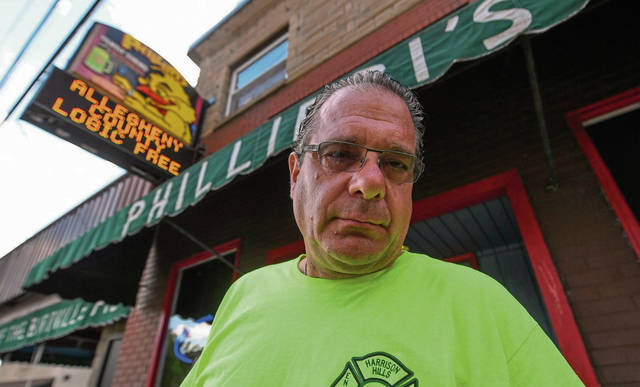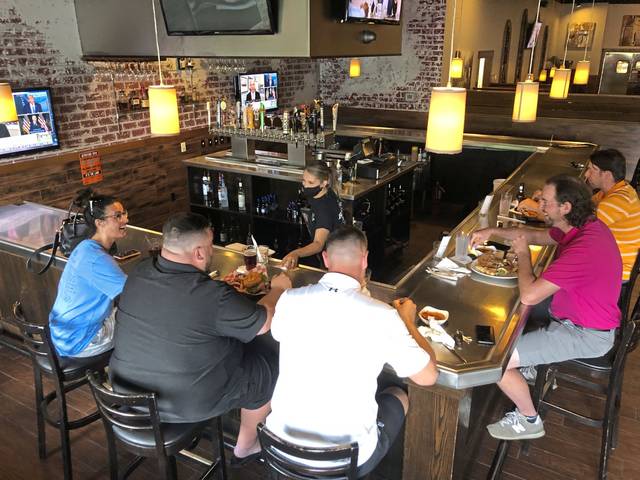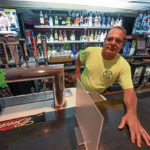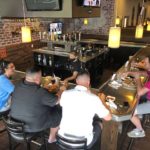Mark Phillippi, owner of Phillippi’s Family Dining and Pizzeria in Harrison, suddenly feels hamstrung by geography.
Come this evening, his restaurant at the northern tip of Allegheny County will be barred from serving alcohol to customers by order of the county.
“It makes absolutely zero sense,” Phillippi said Monday. “Tell me why people sitting at a table eating dinner can’t have an alcoholic drink, but they can sit there and eat dinner? Does that mean if we were all drinking and we wanted to protest, we wouldn’t be able to because we were drinking — but if we were sober and we wanted to jam into an enclosed space and protest, we can?”
He noted Harrison’s proximity to Armstrong and Westmoreland counties, where no such restrictions exist.
Allegheny County Health Department Director Debra Bogen on Sunday issued the order that goes into effect at 5 p.m. today.
“I can drive one mile over the hill and eat and drink whatever I want,” said a flummoxed Phillippi. “I can drive right over the Tarentum Bridge and eat and drink whatever I want.”
Driving over the Tarentum Bridge could land people at Harry’s Bar & Grill in New Kensington, where bar manager Joe Molnar said staff is taking all things covid-related one day at a time.
“There’s just so much unknown,” Molnar said. “Everything changes by the day. We just keep adapting.”
Farther south in the county, the Brick House Tap & Grill is a short jaunt from the Allegheny County border on Route 30 in Irwin. Manager Craig Stahl said his staff’s challenge will be balancing health and safety guidelines with a potential bump in business.
“I could see that happening with us being right on the border, especially from places like White Oak,” Stahl said. “That’s going to be hard to control, but we’ve been taking the measures to do it.”
As the weekend approaches and business picks up, it may get tougher, he said.
“On our normal Friday night, if we have to stop people at the door until we get to a place where we let them in, people may be waiting outside. Hopefully they know they can also get takeout,” Stahl said.
Sean Casey, founder and owner of the Church Brew Works in Lawrenceville, prefers to look for positives amid the negative impacts that coronavirus has had on the bar and restaurant industry.
Sales plummeted following the March order limiting restaurants to takeout and delivery only. But Casey points to an increase in sales by about 15% since Allegheny County entered the green phase June 5, which permitted bars and restaurants to reopen for sit-down service.
He said he’s urging his staff to be creative. The brew pub is planning to offer exotic non-alcoholic drinks from mints and other herbs grown on site. For the first time, their beer will be offered in cans for takeout.
“I’m not dwelling on how far down we are,” Casey said. “I’m like, look how well our sales have increased through this whole thing. Our business went from being down 98% percent during curbside, to 85% when we opened for dine-in service. You have to look for positives.”
Bogen said the virus spread among people who have congregated at bars in Pittsburgh’s South Side and Oakland neighborhoods and have traveled to out-of-state hotspots like Florida, Texas and the beaches along the Carolina coastline.
She said people under the influence are less likely to follow recommended guidelines — social distancing, wearing of facial covers and avoiding large crowds — for stopping the spread of covid-19.
Reaction to the order was mixed with some owners calling it senseless and others saying it won’t have a major impact on business.
Christina Mair, associate professor of behavioral and community health sciences at the University of Pittsburgh’s Graduate School of Public Health, said Bogen’s order makes sense. She said bars present a “perfect storm” of activities that lead to the spread of coronavirus.
Bars are high-risk venues because people are packed together, talking and yelling and touching each other, Mair said. People going out to dinner may practice social distancing and wear a mask, but a few drinks will change all that.
“It makes people take more risks than they would if they weren’t drinking,” she said. “From my own perspective, if you ask me what am I going to do, what activities will I take, large crowded indoor events are absolutely the last thing I would do, followed closely by a bar. It’s a perfect storm of things coming together.”
Jen Grippo, owner of the landmark Oyster House in Pittsburgh’s Market Square, said the new regulations would have little impact. She said while both the bar and restaurant sections have been open, the majority of her business is food service.
“We’re not the type of bar where you come down and have mixed cocktails or anything like that,” she said. “Most of our sales have been in food.”
At Independent Brewing Company in Squirrel Hill, co-owner Peter Kurzweg, writing on IBC’s website, called the county’s action “understandable” in light of the rising number of coronavirus infections, likely from larger numbers of people gathering in bars.
But he criticized the county’s broad-brush approach, saying it’s “based on the false premise that alcohol is the culprit in the transmission, and ignores the fundamental problem: that the bars where cases were transmitted were violating occupancy limits, offered indoor seating, disregarded the use of masks and catered to a younger party crowd.”
His post described the way IBC operates — reservations and outdoor seating only, tables of no more than four people, a 90-minute cap on seating times — as a model to encourage. The problem with the county’s new policy is that “the same jagoffs that were dumb enough to get hammered on the South Side and in Oakland are already planning their epic house party (bruh!)” because the green phase “allows gatherings of up to 250 people. We have solved … nothing.”













